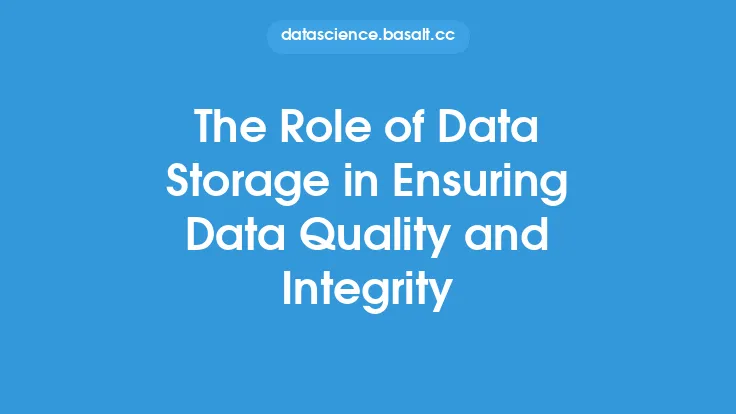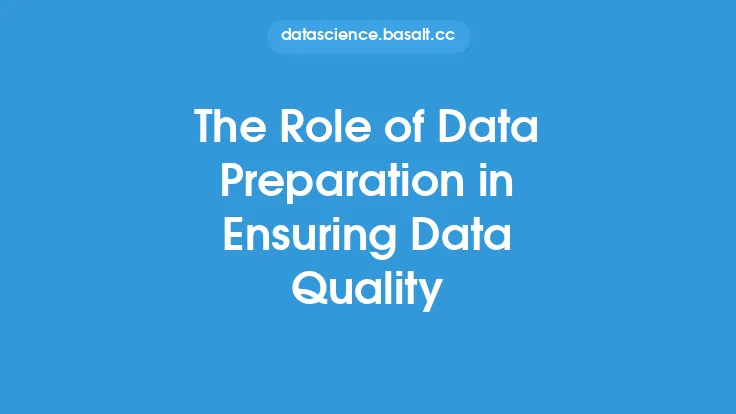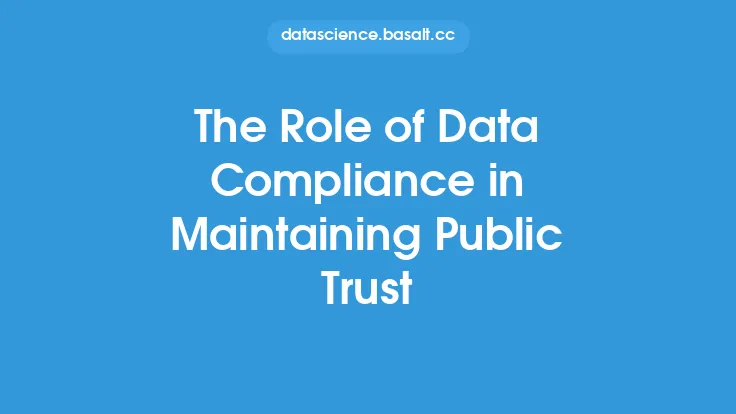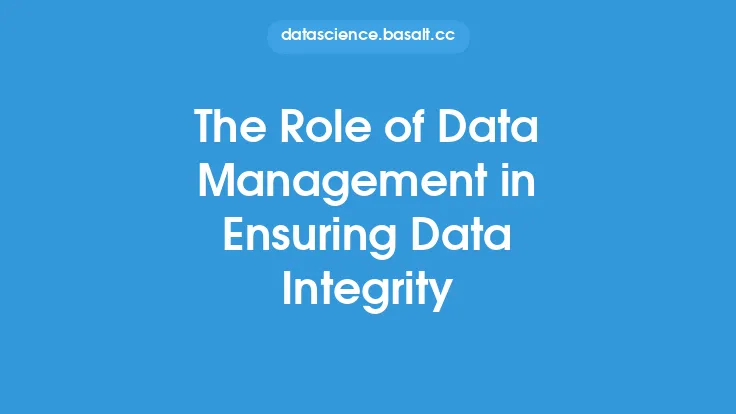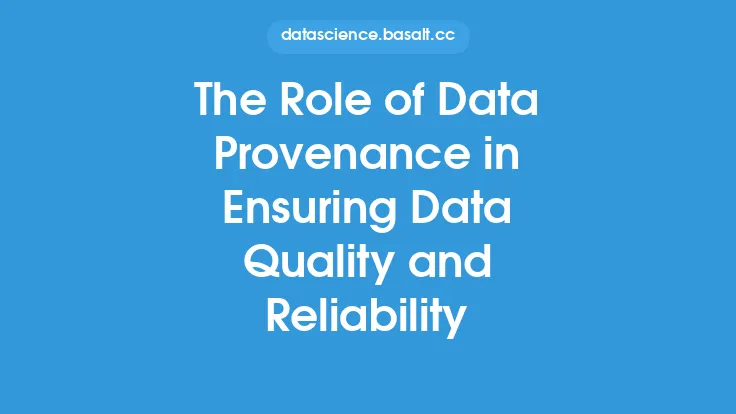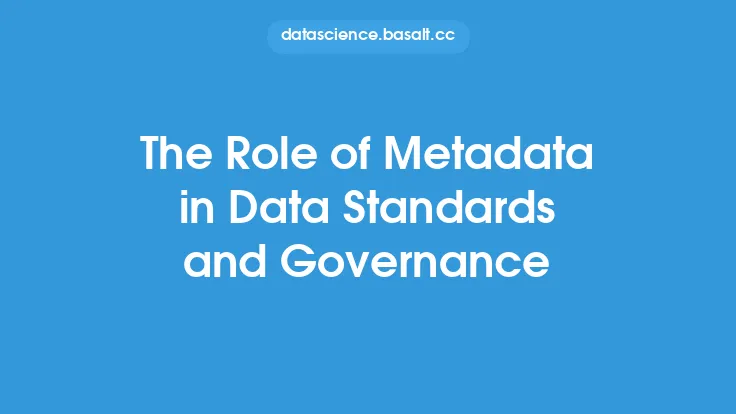Data integrity is a critical aspect of data quality, as it ensures that data is accurate, complete, and consistent throughout its lifecycle. It involves a set of processes and techniques that help to prevent data from being modified, deleted, or corrupted, either intentionally or unintentionally. In this article, we will delve into the role of data integrity in maintaining data quality, exploring its importance, benefits, and best practices.
Introduction to Data Integrity
Data integrity is a broad term that encompasses a range of concepts, including data accuracy, data completeness, data consistency, and data reliability. It is a critical component of data quality, as it ensures that data is trustworthy, reliable, and fit for purpose. Data integrity is not just about preventing data errors, but also about ensuring that data is handled and processed correctly throughout its lifecycle. This includes data entry, data storage, data processing, and data analysis.
The Importance of Data Integrity
Data integrity is essential for maintaining data quality, as it ensures that data is accurate, complete, and consistent. Inaccurate or incomplete data can lead to incorrect insights, poor decision-making, and ultimately, business failure. Data integrity is also critical for ensuring compliance with regulatory requirements, such as data protection and privacy laws. Furthermore, data integrity helps to build trust in data, which is essential for making informed decisions and driving business success.
Benefits of Data Integrity
The benefits of data integrity are numerous and significant. Some of the key benefits include:
- Improved data accuracy and completeness
- Enhanced data consistency and reliability
- Better decision-making and insights
- Increased trust in data
- Improved compliance with regulatory requirements
- Reduced risk of data breaches and cyber attacks
- Improved data security and protection
- Increased efficiency and productivity
Data Integrity Techniques
There are several techniques that can be used to ensure data integrity, including:
- Data validation: This involves checking data for accuracy and completeness at the point of entry.
- Data normalization: This involves transforming data into a standard format to ensure consistency.
- Data encryption: This involves protecting data from unauthorized access using encryption algorithms.
- Access control: This involves restricting access to data to authorized personnel only.
- Data backup and recovery: This involves creating regular backups of data and having a disaster recovery plan in place.
- Data auditing: This involves regularly checking data for errors and inconsistencies.
Data Integrity Tools
There are several tools that can be used to ensure data integrity, including:
- Data quality software: This includes tools such as data profiling, data validation, and data cleansing.
- Data governance software: This includes tools such as data cataloging, data lineage, and data metadata management.
- Data security software: This includes tools such as encryption, access control, and intrusion detection.
- Data backup and recovery software: This includes tools such as backup and restore, disaster recovery, and business continuity planning.
Best Practices for Data Integrity
There are several best practices that can be followed to ensure data integrity, including:
- Develop a data integrity policy: This should outline the organization's approach to data integrity and include procedures for ensuring data accuracy, completeness, and consistency.
- Implement data validation and verification: This should include checks for data accuracy and completeness at the point of entry.
- Use data encryption: This should include encrypting sensitive data both in transit and at rest.
- Implement access control: This should include restricting access to data to authorized personnel only.
- Regularly backup and recover data: This should include creating regular backups of data and having a disaster recovery plan in place.
- Regularly audit data: This should include regularly checking data for errors and inconsistencies.
Challenges and Limitations
Despite the importance of data integrity, there are several challenges and limitations that organizations may face when trying to ensure data integrity. These include:
- Data complexity: As data volumes and varieties increase, it can become more challenging to ensure data integrity.
- Data silos: When data is stored in separate silos, it can be difficult to ensure data consistency and integrity.
- Lack of resources: Ensuring data integrity can require significant resources, including time, money, and personnel.
- Limited expertise: Ensuring data integrity requires specialized expertise, which can be limited in some organizations.
Future of Data Integrity
The future of data integrity is likely to be shaped by several trends and technologies, including:
- Artificial intelligence and machine learning: These technologies can be used to automate data integrity tasks, such as data validation and data cleansing.
- Cloud computing: This can provide greater flexibility and scalability for data storage and processing, but also introduces new data integrity challenges.
- Internet of Things (IoT): This can generate vast amounts of data, which can be challenging to ensure data integrity for.
- Blockchain: This can provide a secure and transparent way to store and process data, but also introduces new data integrity challenges.
Conclusion
In conclusion, data integrity is a critical aspect of data quality, as it ensures that data is accurate, complete, and consistent throughout its lifecycle. It is essential for maintaining trust in data, ensuring compliance with regulatory requirements, and driving business success. By following best practices, using data integrity tools, and staying up-to-date with the latest trends and technologies, organizations can ensure data integrity and maintain high-quality data.
